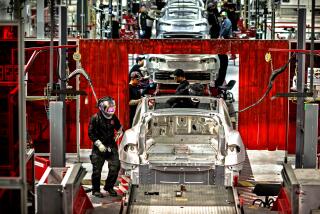RV maker to close factory in Southland
- Share via
Fleetwood Enterprises Inc., a Riverside-based recreational vehicle maker, will close the Rialto plant that rolled out its 100,000th travel trailer less than three years ago.
The plant, opened in the early 1970s, will be the third to close as the manufacturer works to thin a unit that has lost $41.9 million this fiscal year.
“We have not been profitable in the travel trailer division, consistently, for quite some time,” said Kathy Munson, Fleetwood’s director of investor relations. “We intend to get that division back to profitability by reducing capacity.”
Munson said Monday that the 429 Rialto employees would keep their jobs until the plant closes, at the latest by May 1.
“We’re hoping that we’ll be able to place a number of those people in our motor home facility” in Riverside, she said, adding that Fleetwood executives had not determined how many workers would move.
Fleetwood posted a net loss of $29.9 million in its fiscal third quarter ended Jan. 28. That compared with profit of $1.4 million a year earlier after demand spiked for temporary housing because of Hurricane Katrina.
The division that makes travel trailers, which retail for $15,000 to $60,000, lost $17.5 million in the third quarter.
Munson said Fleetwood lost market share partly because it centralized operations in California in 2005.
“The decisions that were being made here in Riverside were too far away from our customers, and we lost sight of some of the things that were important,” she said. On the East Coast and in the Midwest, for example, RV owners are more likely to use the trailers for hunting than those on the West Coast.
Jay McCanless, senior analyst at FTN Midwest Securities Corp., said Fleetwood’s skidding performance was in line with the rest of the industry.
“In motor homes, everyone seems to be doing fairly well right now,” he said. “But in travel trailers, everyone’s having a difficult year.”
He said the core problem was an inventory surplus: RV companies, perhaps expecting an active 2006 hurricane season, planned to sell plenty of travel trailers to displaced homeowners.
“We didn’t really have any hurricanes to speak of last year,” McCanless said, “so the RV retail dealers ended up carrying a lot more travel trailer inventory than they had anticipated.”
McCanless said that to cut costs, Fleetwood had minimized the number of models it produces at each plant.
“If you’re producing more of the same model,” he said, “theory says that you should gain greater efficiency and lower your marginal cost per year.”
Munson said that before a third-quarter realignment, one plant was building travel trailers with as many as 80 floor plans. That number has been cut by about half, she said.
Fleetwood’s travel trailer division has been the company’s least profitable since a deteriorating retail housing division was sold in summer 2005. The company also sells motor homes and folding trailers.
After the closings, Fleetwood will maintain 30 plants throughout North America. The company will continue making travel trailers at six plants.
Fleetwood shares rose 6 cents to $7.54. The shares have declined 31% in the last year.
More to Read
Inside the business of entertainment
The Wide Shot brings you news, analysis and insights on everything from streaming wars to production — and what it all means for the future.
You may occasionally receive promotional content from the Los Angeles Times.










